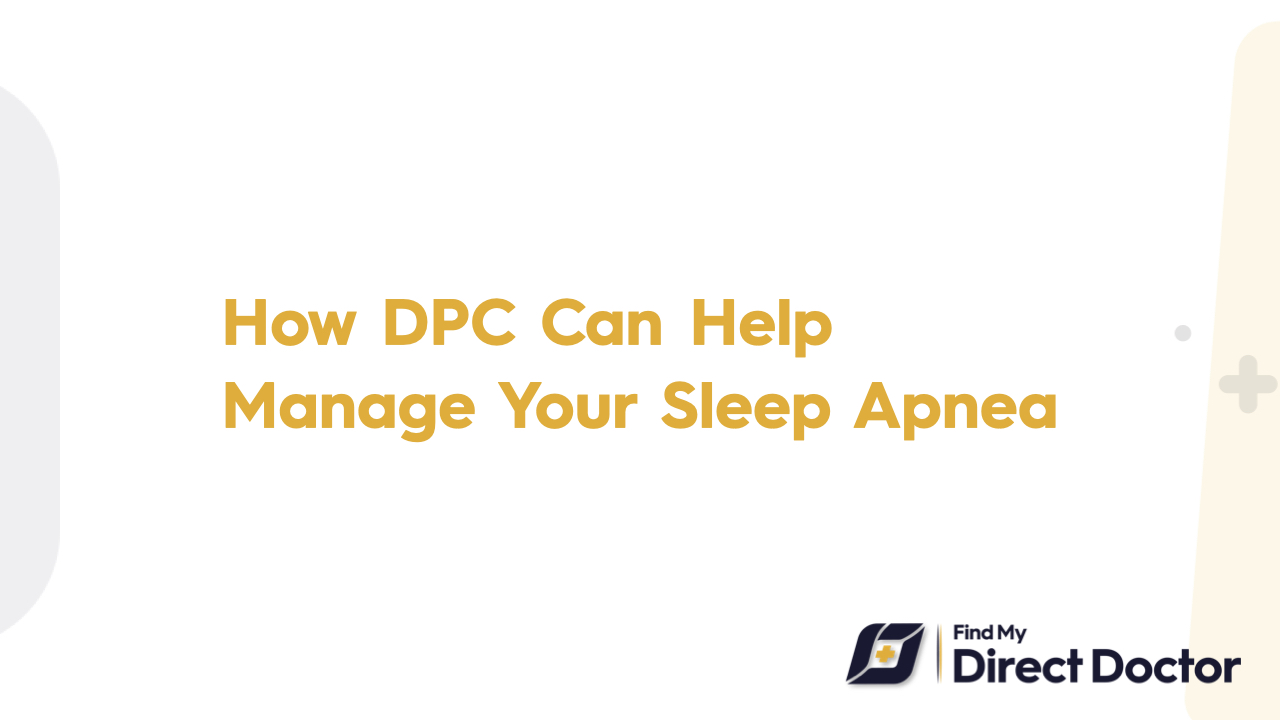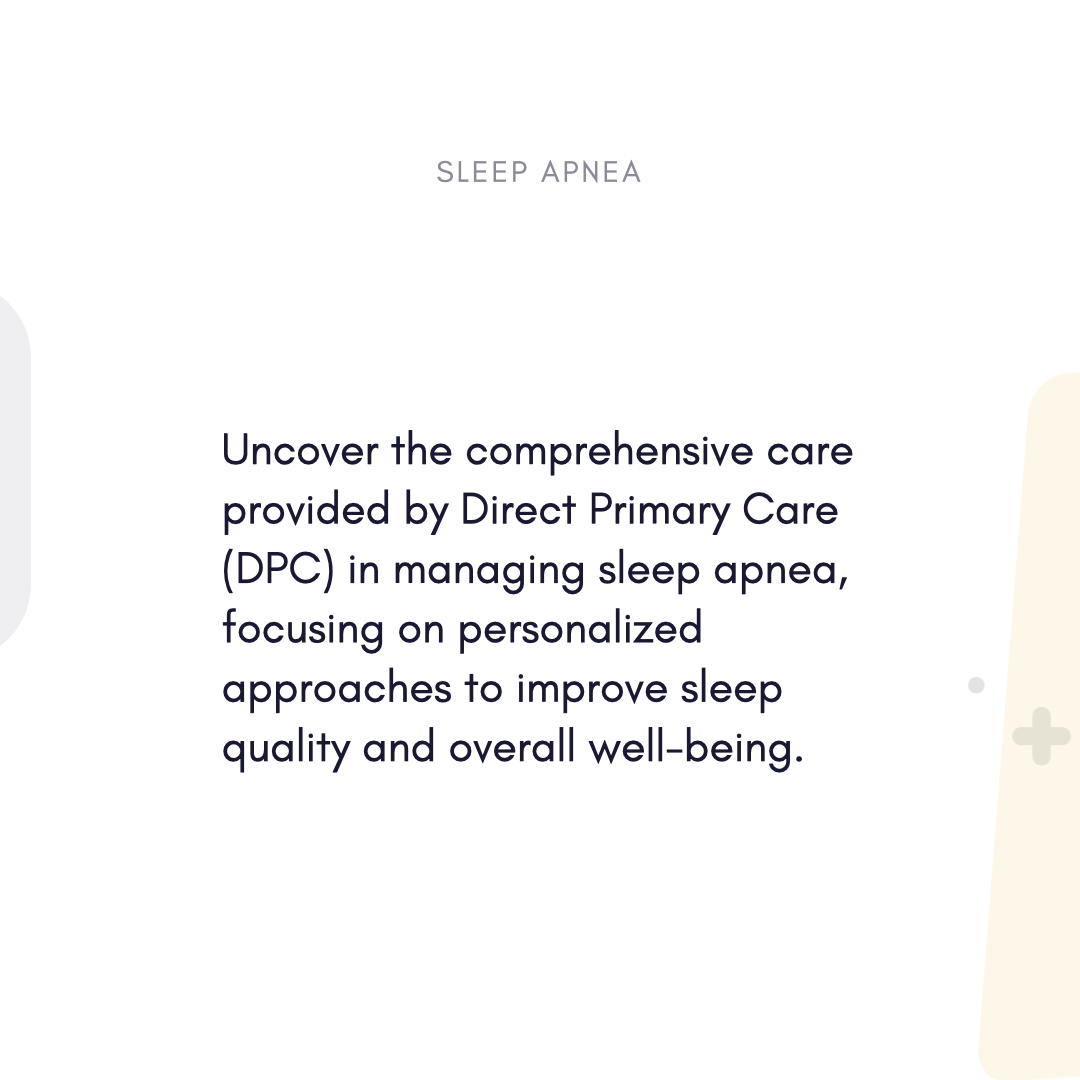Sleep Apnea and Direct Primary Care (DPC): Restful Nights, Personalized Solutions
You know the toll of sleep apnea if you have ever woken up gasping for air, suffered daytime tiredness even with "enough" sleep, or been told your snoring shakes the walls. Affecting 25 million Americans, this disorder increases the risk for heart disease, stroke, and accidents; yet, half of them are not diagnosed at all. Hope exists, though: Combining fast diagnostics, cost transparency, and care fit for your lifestyle, Direct Primary Care (DPC) presents a proactive, patient-first method of treating sleep apnea.

Knowing Sleep Apnea and Its Complications
Often resulting from breathing repeatedly stopping and starting during sleep, sleep apnea is caused by:
- Obstructive sleep apnea (OSA): Most commonly, throat muscles collapse, so obstructing airflow.
- CSA, or central sleep apnea: Brain ignores the signals for breathing muscles.
Typical problems:
- Nighttime loud snoring or choking/gasping
- Sore throat, dry mouth, or morning headaches
- Daytime tiredness, impatience, or poor focus
Long-term hazards of uncontrolled sleep apnea:
- Heart attacks, high blood pressure, arrhythmias
- Either metabolic syndrome or type 2 diabetes
- Depression or cognitive deterioration
DPC Changes: Sleep Apnea Treatment
Under the membership model known as Direct Primary Care (DPC), patients pay a monthly fee—usually 50 USD–150 USD—for unlimited access to their main care physician. For those with sleep apnea, this means no surprise bills, no months-long waiting for sleep studies, and treatment tailored to your particular needs.
Here's why DPC distinguishes itself:
1. Quick, Guideline-Based Diagnosis
Following American Academy of Sleep Medicine guidelines, DPC doctors do:
- Tests for home sleep apnea: HSAT Reasonably priced, take-home kits for OSA diagnosis free of lab delays.
- Risk stratification: High-risk patient identification using the STOP-BANG questionnaire among others.
- Reviewing CPAP compliance data or remotely adjusting BiPAP settings constitute telehealth follow-ups.
2. Reasonably priced, open treatment
- By providing HSATs at 150 USD–300 USD instead of 1,000 USD+ for in-lab tests, DPC clinics help to lower costs.
- Offering CSA generic drugs like acetazolamide wholesale rates.
- Avoiding needless specialist referrals for mild to moderate OSA sufferers.
3. Constant, technologically enabled assistance.
- Using 24/7 access to your DPC doctor, you can: troubleshoot CPAP mask leaks over video calls.
- Change treatment if allergies or weight loss either aggravate or improve symptoms.
- Use mental health tools to help with anxiety connected to sleep deprivation.
DPC Benefits for Sleep Apnea Patients: Customized Care Plans
During a visit, DPC physicians spend 30 to 60 minutes creating plans including:
- Customized therapy: Selecting either CPAP, oral appliances, or positional therapy depending on your sleeping patterns.
- Lifestyle coaching: To lower airway inflammation, weight control, alcohol avoidance, or allergy control.
- Myofunctional therapy exercises to build throat muscles combine approaches.
Financial Restraints
- No co-pays for compliance reviews or quick CPAP changes.
- Discounted supplies (CPAP filters at 5 USD instead of 25 USD retail).
- ER visits for severe hypoxia avoided with proactive treatment.
Excellent Specialist Coordination
DPC doctors: should advanced care be required,
- Negotiate pay rates for sleep neurologists or ENT surgeons.
- Share your information to avoid needless testing—that is, duplicate sleep studies.
- Track long-term results to avoid relapsus.
Stories from Real Life Success
- Case 1: John, 45, avoided CPAP because of claustrophobia. In four weeks his DPC doctor prescribed a mandibular advancement device at cost to help with snoring and tiredness.
- Case 2: Lisa, 58, battled HSAT expenses. Her DPC clinic saved 1,200 USD by diagnosing modest OSA and offering a loaner device.
Ask questions about DPC and sleep apnea.
- Q: Can DPC handle difficult problems like central sleep apnea?
- A: Indeed. DPC physicians prescribe treatments including adaptive servo-ventilation (ASV) and coordinate with cardiologists or neurologists.
- Q: For lifetime CPAP users, is DPC within reach?
- A: Definitely. Against conventional insurance models, members save 40–60% yearly on supplies and compliance checks.
- Q: What should I do if I need a sleep specialist?
- A: A DPC doctor often gets discounted cash rates for consultations and speeds referrals.
Why DPC Benefits Those With Sleep Apnea?
The American College of Physicians stresses DPC's ability to use continuity and patient trust to enhance chronic disease outcomes. For sleep apnea, this translates into:
- Early treatment reduces cardiovascular risks, so speeding diagnosis.
- Holistic treatment addresses sleep, food, and stress as related elements.
- Financial clarity: One consistent monthly cost pays for unlimited care.
Take Back Your Sleep with DPC.
Sleep apnea does not have to make you anxious and worn out. DPC helps you to find a partner who advocates, innovates, and gives your rest top priority night after night.






